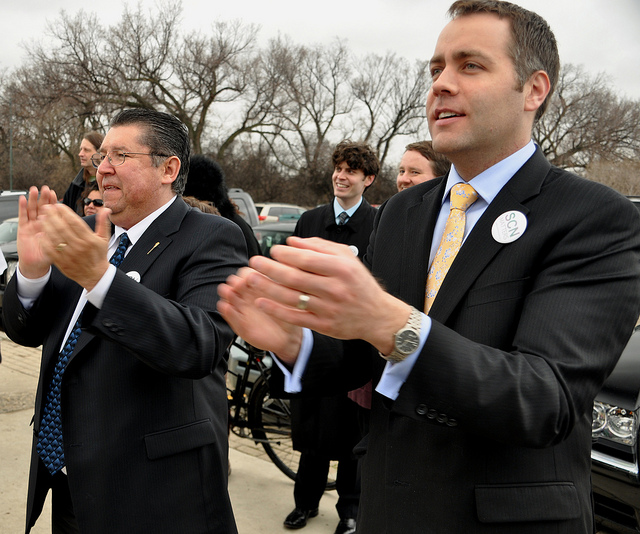Like this article? rabble is reader-supported journalism. Chip in to keep stories like these coming.
On April 4, Saskatchewanians head to the polls. Brad Wall’s right-wing government has been in power for nine years.
Wall has been riding high on good economic news for most of his term as premier, thanks in part to Saskatchewan’s resource extraction industry. But despite similarities with Alberta pre-Rachel Notley, it’s not looking like the Saskatchewan NDP will take power from the Saskatchewan Party.
While Wall defends his leadership record, the Saskatchewan NDP seems to be taking its cues from other NDP election campaigns — notably B.C. in 2013 and Ontario in 2014 — that gambled on minor, incremental reforms that might appeal to right-wing voters. We know how well those went.
There is little in the Saskatchewan NDP’s platform that explicitly helps or focuses on women. Some of their promises, like getting rid of the right-wing health-care review process “Lean” will help women, especially women workers in the health-care system, but even their health-care promises stop far short of what a progressive party would commit to — for example, they promise to cap ambulance fees rather than eliminate them outright.
One glaring absence from the NDP’s health-care policy platform should concern feminists and Indigenous rights supporters everywhere: where is the Saskatchewan NDP on ending the forced sterilization of Indigenous women?
Several Indigenous women came forward in 2015 reporting they had been coerced at Saskatoon hospitals into having tubal ligation surgery — surgery that burns or clamps a woman’s fallopian tubes, sterilizing them permanently. The surgeries were pressed on them immediately after having given birth.
In late 2015, the Saskatoon Health Region apologized and a new process has been added to birthing procedures in the Saskatoon Health Region where only women who have made the decision to have tubal ligation before they enter the hospital, in discussion with their doctor, will have any sterilization procedure.
The story alone is a disgusting abuse of the reproductive rights and health of these women, but considered in the context of Canada’s relationship with Indigenous people, it represents the ongoing colonial policies that are occurring in Canada’s health system. While it’s good that the Saskatoon Health Region apologized and put some new procedures into place, the more important reality is that it’s 2016 and the health-care system in Saskatchewan still requires that Indigenous people to blow the whistle on genocidal practices.
After all, “The coercive sterilization of Indigenous women in Canada is genocide proper,” says Dr. Karen Stote, professor at Wilfrid Laurier University and author of An Act of Genocide: Colonialism and Sterilization of Aboriginal Women in Intercontinental Cry Magazine in December.
After the news broke, the Saskatchewan NDP through then-health critic Danielle Chartier called on Wall to condemn the practice.
But with three weeks left in the election campaign there’s no sign of NDP action on forced sterilization, Indigenous women’s health — or nearly anything that strengthens or evolves Saskatchewan’s relationship with Indigenous people. A truly progressive party needs to imagine how to make life better for all people, but especially the most vulnerable from systemic violence, not just tinker with the edges and play it safe with tax cuts for the “middle class.”
Two years ago, Don Kossick predicted that with Cam Broten as leader, the Saskatchewan NDP campaign plan would unfold exactly in this way. In a rabble column on the Saskatchewan NDP leadership race that elected Broten, Kossick wrote: “The win of Cam Broten indicates that NDP in Saskatchewan will take a middle of the road course in Saskatchewan, vying for the votes of the centre to somehow achieve power — a sort of liberal NDP approach.”
Broten only won by 44 votes, narrowly beating Dr. Ryan Meili, whose work at a medical clinic in downtown Saskatoon has deeply informed his politics. In that article, Kossick warned that Broten would have to negotiate with Meili’s more progressive vision, and his supporters, if he were to have a chance at defeating Wall.
If that negotiation ever happened there’s no reflection in the Saskatchewan NDP’s platform.
The team running for the Saskatchewan NDP is the most diverse it has ever been: 13 per cent of their candidates are Aboriginal and 45 per cent are women, according to their website. Why has this new level of diversity not seemingly had an impact on the party’s policies?
The NDP forcefully rejecting forced sterilization practices and imagining new ways to detangle systemic racism from the province’s medical system isn’t likely to win the election, nor should they commit do doing this if elected because it might. It would send a strong signal that Indigenous people, especially women, are important, valued and central to the political and social life of Saskatchewan.
Photo: flickr/ Sask NDP




